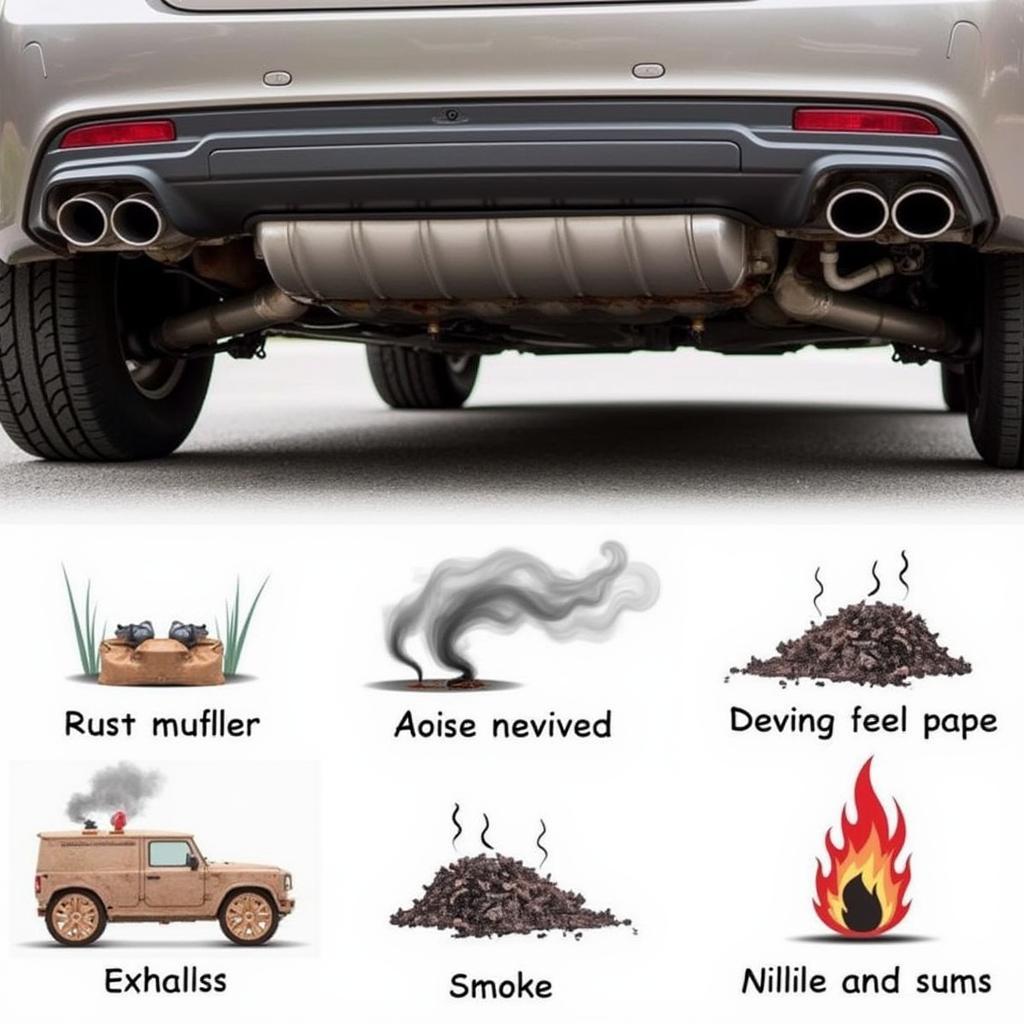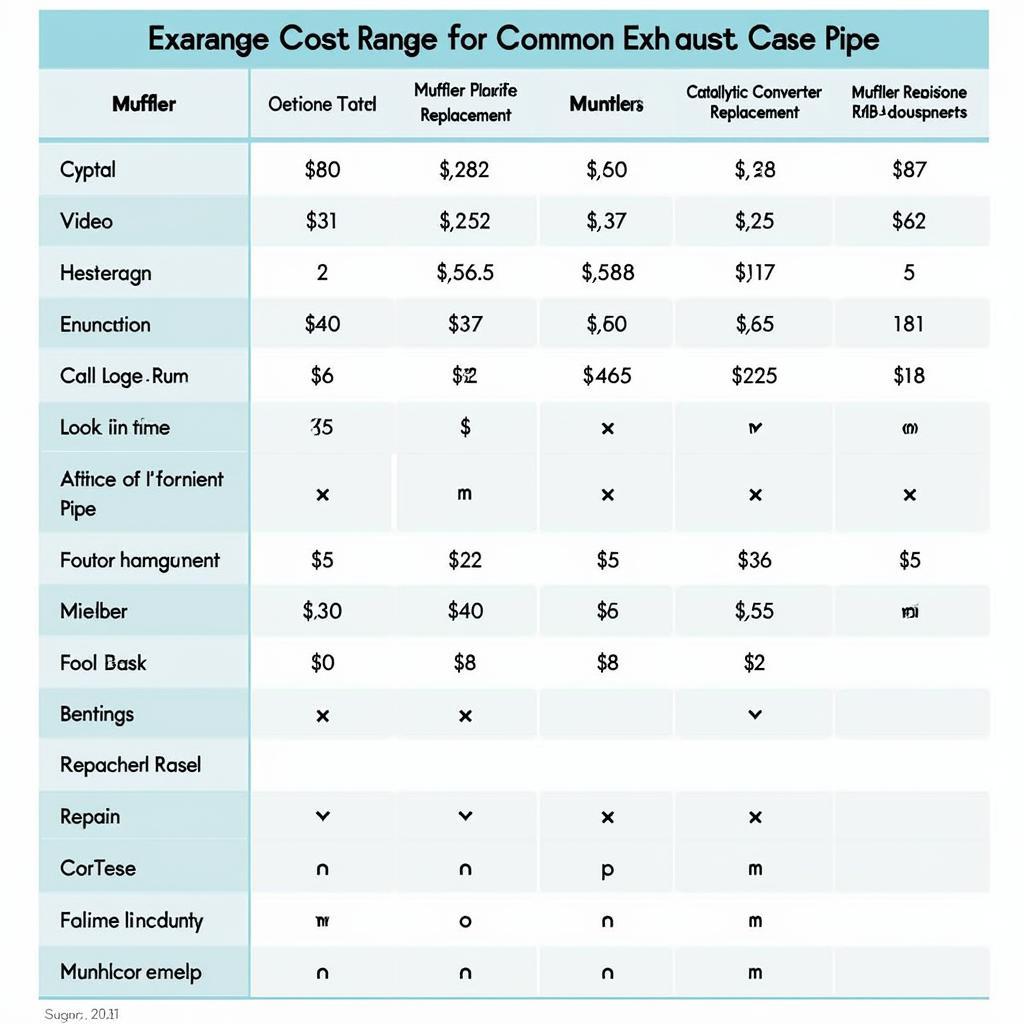Finding reliable auto mufflers and exhaust systems repair services can be a challenge. You want quality work at a fair price, and sifting through Angie’s List reviews can be time-consuming. This guide will explore everything you need to know about muffler and exhaust repair, helping you make informed decisions and keep your car running smoothly.
Understanding Your Car’s Exhaust System
Your car’s exhaust system does more than just muffle noise. It plays a crucial role in reducing emissions and ensuring optimal engine performance. From the exhaust manifold to the tailpipe, each component works together. A faulty exhaust system can lead to decreased fuel efficiency, increased emissions, and even engine damage. Knowing the basics can empower you to communicate effectively with mechanics and avoid unnecessary repairs.
Key Components of the Exhaust System
- Exhaust Manifold: Collects exhaust gases from the engine cylinders.
- Catalytic Converter: Reduces harmful pollutants in the exhaust gases.
- Muffler: Reduces engine noise.
- Resonator: Further reduces exhaust noise and helps tune the exhaust note.
- Tailpipe: Directs exhaust gases away from the vehicle.
Common Signs of Exhaust System Problems
Recognizing the signs of a failing exhaust system is key to preventing further damage and costly repairs. Listen for unusual noises, such as rattling, rumbling, or hissing. These sounds can indicate a leak or a damaged component. Other signs include decreased fuel efficiency, a noticeable smell of exhaust fumes inside the car, or vibrations in the gas pedal or steering wheel.
What to Look For:
- Unusual Noises: Rattling, rumbling, hissing, or roaring.
- Reduced Fuel Efficiency: A sudden drop in miles per gallon.
- Exhaust Fumes: Smelling exhaust inside the car.
- Vibrations: Feeling vibrations in the gas pedal or steering wheel.
- Check Engine Light: This light can illuminate for various reasons, including exhaust system problems.
 Signs of an Exhaust Leak
Signs of an Exhaust Leak
Finding a Reliable Auto Muffler & Exhaust Repair Service
Finding a trustworthy mechanic is essential for quality repairs. While Angie’s List can be a helpful resource, there are other ways to find reputable auto muffler and exhaust system repair services. Ask for recommendations from friends, family, or coworkers. Check online reviews on platforms like Google Reviews and Yelp. Look for certifications and affiliations with reputable organizations, such as the National Institute for Automotive Service Excellence (ASE).
Questions to Ask a Potential Mechanic:
- What is your experience with exhaust system repairs?
- Can you provide a detailed estimate before starting any work?
- What type of warranty do you offer on your repairs?
- Do you use OEM or aftermarket parts?
“Choosing a qualified mechanic is just as important as choosing the right parts,” says John Miller, ASE Certified Master Technician. “A skilled technician can diagnose the problem accurately and provide lasting repairs.”
The Cost of Auto Muffler & Exhaust System Repairs
The cost of repairs can vary depending on the extent of the damage, the type of vehicle, and the location of the repair shop. A simple muffler replacement might cost a few hundred dollars, while a more complex repair involving the catalytic converter could cost significantly more. Always get multiple estimates before making a decision.
Factors Affecting Repair Costs:
- Type of Repair: Simple repairs like muffler replacement are generally less expensive than catalytic converter replacements.
- Vehicle Make and Model: Parts for some vehicles can be more expensive than others.
- Labor Costs: Labor rates vary by location and shop.
 Average Muffler Repair Costs
Average Muffler Repair Costs
Maintaining Your Exhaust System
Proper maintenance can extend the life of your exhaust system and prevent costly repairs. Regular inspections can identify potential problems early on. Avoid driving through deep puddles or over rough terrain, which can damage the exhaust system.
Conclusion
Finding reliable auto mufflers & exhaust systems repair services doesn’t have to be a daunting task. By understanding the basics of your exhaust system, recognizing the signs of problems, and choosing a qualified mechanic, you can keep your car running smoothly and avoid expensive repairs. Don’t solely rely on Angie’s List; explore other resources and ask the right questions to ensure you’re getting the best service possible.
FAQs
- How often should I have my exhaust system inspected? It’s a good idea to have your exhaust system inspected annually or as part of your regular vehicle maintenance.
- What is the difference between OEM and aftermarket parts? OEM (Original Equipment Manufacturer) parts are made by the vehicle manufacturer, while aftermarket parts are made by third-party companies.
- Can I repair my exhaust system myself? While some minor repairs might be possible, exhaust system repairs often require specialized tools and expertise.
- How long does a muffler typically last? A muffler can last anywhere from 5 to 10 years, depending on driving conditions and maintenance.
- What causes a catalytic converter to fail? A catalytic converter can fail due to various reasons, including damage from road debris, overheating, or contamination from engine oil or coolant.
Common Scenarios & Questions
Scenario: Loud rumbling noise from under the car.
Question: What could be causing this noise?
Scenario: Check engine light is on.
Question: Could this be related to the exhaust system?
Scenario: Smelling exhaust fumes inside the car.
Question: Is this dangerous?
Further Reading & Resources
- Check out our article on “Choosing the Right Mechanic for Your Car.”
- Learn more about “Common Car Problems and Their Solutions.”
Need help with your car’s exhaust system? Contact us via WhatsApp: +1(641)206-8880, Email: [email protected] or visit our workshop at 321 Birch Drive, Seattle, WA 98101, USA. Our 24/7 customer support team is always ready to assist you.


